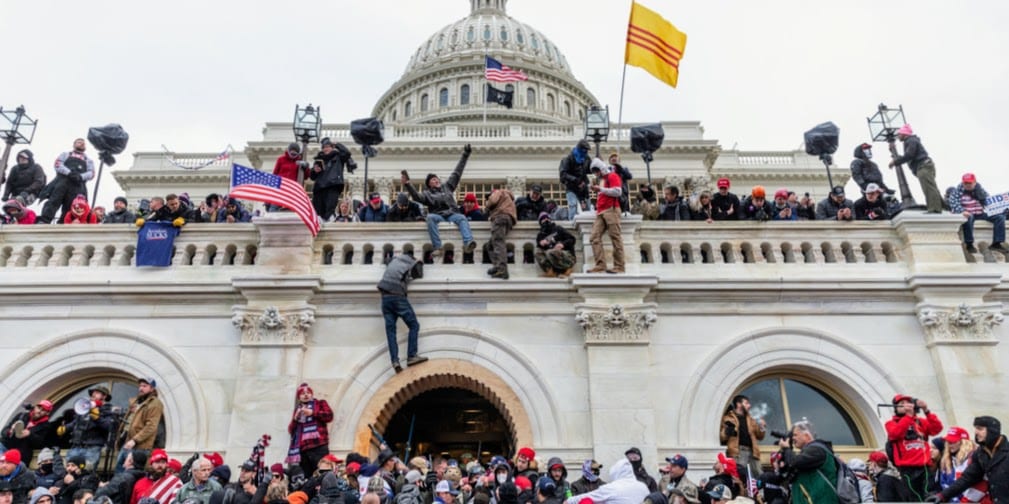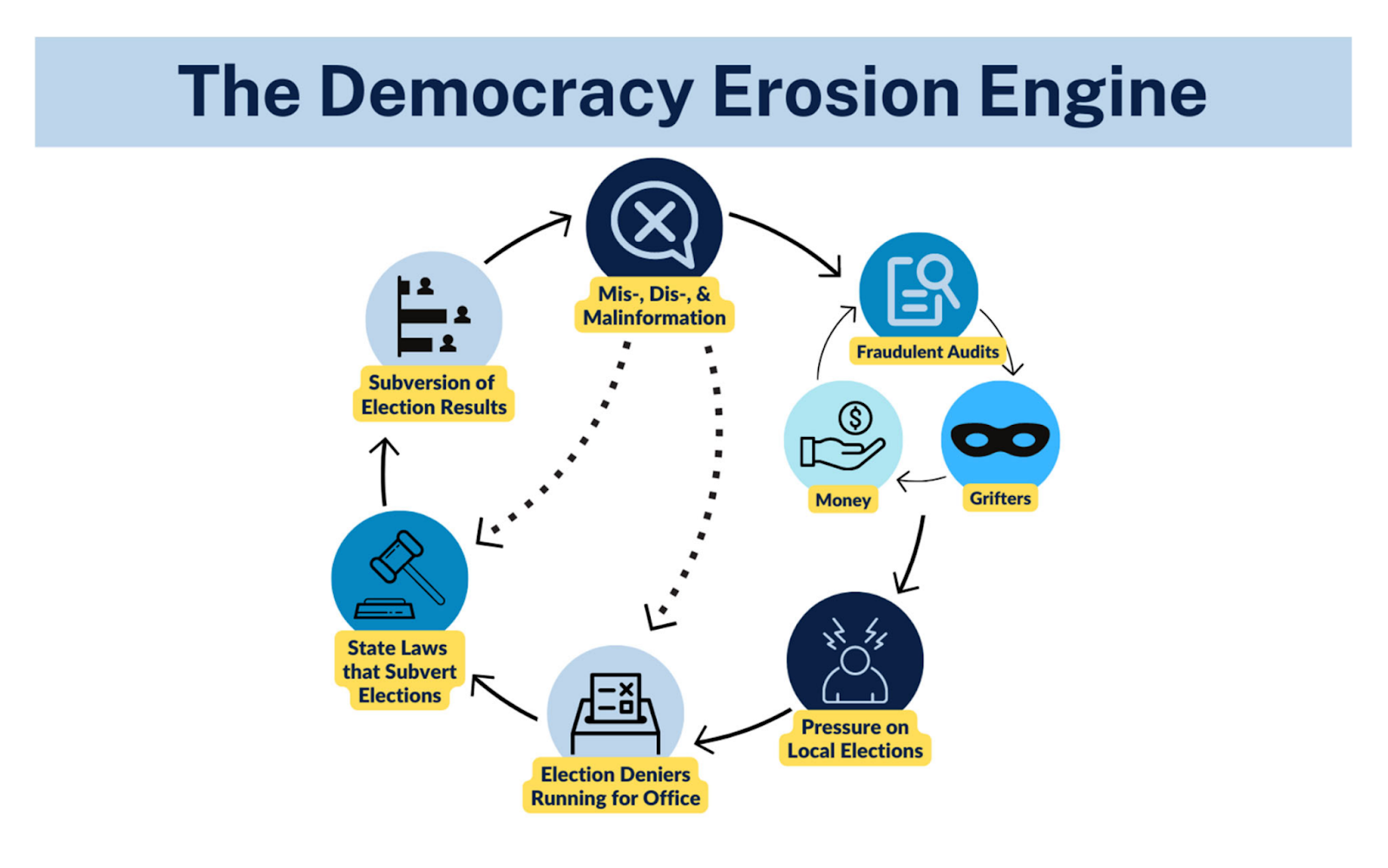“Exhausting and Dangerous:” Is Election Disinformation a Priority for Platforms?
Justin Hendrix / Aug 16, 2022As the temperature rises ahead of the U.S. midterm elections, the Big Lie is thriving.

Last week, in a series of tweets, Twitter announced that it will begin enforcing its “Civic Integrity Policy” in the context of the approaching U.S. midterm elections. “This means we’ll take action against misleading claims about the voting process, misleading content intended to intimidate or dissuade people from participating in the election, or misleading claims that may undermine public confidence in elections outcomes,” the company said. A blog post detailed plans to introduce newly redesigned labels on misleading posts, “prebunks” intended to “get ahead of misleading narratives on Twitter,” and information “hubs” to share state-specific information about elections.
Twitter’s announcement, while less than three months before election day, suggests it is taking a relatively more active approach than other major platforms, such as Facebook, where there is evidence that elections and civic integrity are less of a priority than in past cycles; or TikTok, which is “shaping up to be a primary incubator of baseless and misleading information,” according to The New York Times. YouTube, to date, is characteristically mum on whether it will implement any special measures ahead of the midterms (though it did recently delete a video posted by the House Select Committee investigating the January 6 attack on the U.S. Capitol that included a clip of former President Donald Trump lying about the 2020 election in an appearance on Fox Business.)
As falsehoods about U.S. elections spread by Republican political elites and influencers continue to proliferate on social media platforms and across right-leaning media, so do the downstream consequences, including increased threats of right-wing violence against election workers and a loss of trust in democratic institutions. Without the relative urgency demonstrated in the 2020 Presidential cycle, are the platforms properly prepared for this cycle, even as election deniers are positioned to take crucial offices in 2024 battleground states such as Arizona, Georgia, Michigan, Nevada, Pennsylvania and Wisconsin?
“Exhausting and Dangerous”
On the same day that Twitter made its announcement, the U.S. House Committee on Oversight and Reform published a majority staff report, “Exhausting and Dangerous”: The Dire Problem of Misinformation and Disinformation. The report considers “how misinformation and disinformation drive fraudulent efforts to cast doubt on legitimate election results, increase threats to election administrators, and create pathways for bad actors to subvert our democratic elections.” Based on information about the impact of election disinformation and threats provided to the Committee in response to letters it sent to election officials in Arizona, Texas, Florida and Ohio, the report includes a range of recommendations.
The majority staff report is replete with warnings and accounts of violent threats shared by the officials. For instance:
- Florida election officials reported that their offices have “been consumed with responding to numerous public records requests, debunking election myths, and increasing voter education efforts to strengthen voter confidence in the elections process.”
- The President of the Texas Association of Election Administrators, Remi Garza, detailed alarming threats against one particular election administrator in the association, including a call on social media to “hang him when convicted for fraud and let his lifeless body hang in public until maggots drip out of his mouth.”
- Lisa Marra, the President of the Election Officials of Arizona, raised concerns about violent rhetoric driving election workers from their careers. “The fact so many of us are leaving the field should concern every person across the country, he said. “These jobs are complicated and difficult enough during normal times, but what employee, in any industry, wants to come to work every day to be villainized in the news, online, stalked, or threatened by angry members of the public?”
- On the occasion of the report’s publication, House Oversight Committee Chairwoman Carolyn Maloney, D-NY, convened a group of experts for a panel discussion. During the panel, Marra told the Committee that “people who voted for years and were never concerned with simple things like candidate rotation on the ballot now think everything is a conspiracy.”
- Choking back tears, Tina Barton, a former elections clerk in Michigan, noted to the panel that death threats she received after standing up for the election’s integrity were “laced with obscenities, threats to my life and my family member’s lives, and used sexually charged language.” She said over 1,000 threats against election officials have been reported to the Department of Justice. “If elections are truly critical infrastructure, we must protect them, and those that administer them.”
The majority staff report says that election disinformation has created “a feedback loop that produces more false information, heightens threats and pressures on election administrators, and increases the possibility of election subversion,” a process described as “the democracy erosion engine.”
In its conclusion, the report includes recommendations for executive and legislative actions that it says should be taken at the federal level to address disinformation:
- It calls on the President to “designate a lead federal agency or office to support state and local efforts to counter election misinformation,” and to direct other federal agencies to address the problem, working with state and local election officials and with social media and “legacy media platforms.”
- It recommends that the Cybersecurity and Infrastructure Security Agency (CISA) work with state authorities to establish state-level “rumor control” websites, similar to the initiative CISA operated at the federal level in 2020.
- It calls on the Department of Justice to continue and expand its Election Threats Task Force, which was created in 2021, and for the FBI to supply additional guidance on the threat to its field offices and local law enforcement agencies.
- The report calls on Congress to provide additional funding to “allow election officials to invest in physical and cyber security and modernize election equipment,” and to “account for increased security costs and other unprecedented election expenses.”
- And, it calls for the enactment of “meaningful statutory penalties for anyone who threatens election officials and administrators.”
Time for a Rethink, But Is There Time for a Rethink?
The “erosion engine” implicates social media platforms in the problem in two key ways. First, they are primary channels for the propagation of falsehoods. And second, they are the platforms that enable the “grifters” to match their message with their ask, creating the economic incentives that finance ongoing investment in the Big Lie. (The graphic bears some resemblance to a chart prepared by University of Washington researcher Kate Starbird that depicts the “participatory” nature of the Big Lie.)
The fundamental designs and business models of the platforms appear to be at the root of the problem: more fact checks and moderation, better labels and information centers– no matter how well crafted and widely propagated– will no doubt fail to counter the problem at scale, particularly given a substantial proportion of Republican elites show no sign of abandoning their strategy to advance conspiracy theories and sow doubt. And there are legitimate questions as to the efficacy of the endless battle against disinformation.
That does not mean social media platforms are off the hook; clearly they should do more and invest more. But it may also mean it is necessary to more urgently advance other solutions to blunt the impact of the Big Lie.
In the panel discussion accompanying the report’s release, Free Press Action senior counsel and director of digital justice and civil rights Nora Benavidez pointed to the need to hold social media platforms to account, and but also to invest in trusted journalism. “In the absence of robust news coming to people through other channels, online users are consuming content largely in their own social-media echo chambers– predicated on platforms’ abusive data practices, in which they target users based on our behaviors and preferences,” she said.
Time is short for a rethink, and the temperature is rising. The same day that Twitter announcement was made and the Oversight Committee majority staff report was published, an armed man named Ricky Shiffer attacked an FBI field office in Ohio. Social media posts under accounts with the same name– on Facebook, Twitter, and Truth Social– suggest Shiffer may have been motivated to carry out the attack due to anger over the FBI’s search of former President Donald Trump’s Mar-A-Lago property, an event that provoked extreme rhetoric from right wing influencers, media personalities and some politicians. Posts indicate Shiffer’s rage was also driven by the belief that the 2020 election was stolen from Trump, and that he was present at the Capitol building in Washington DC on January 6, 2021.
As the violence played out in Ohio, Rep. Pete Sessions, R-TX, used his moment as Ranking Member on the Oversight Committee panel to raise doubts about whether the FBI has properly investigated what he regards as improprieties in elections, even vaunting the discredited film 2000 Mules, which advances a range of conspiracy theories about the 2020 cycle. “We have been incapable to hear back from elections officials and federal law enforcement on this issue,” he said.
Exhausting and dangerous, indeed.
Authors

